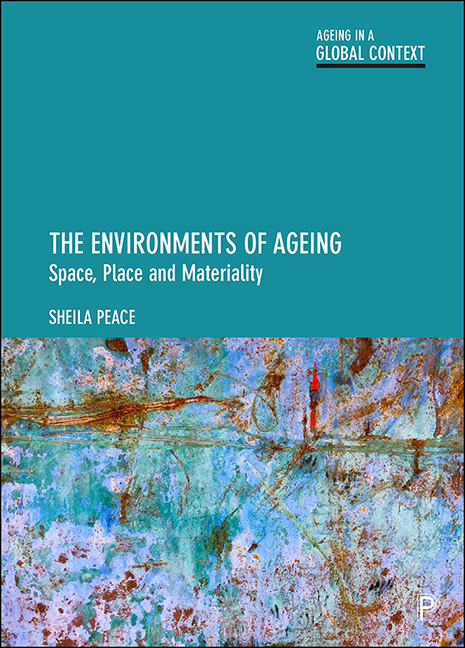Book contents
- Frontmatter
- Dedication
- Contents
- List of figures and tables
- Research summaries
- List of acronyms
- About the author
- Acknowledgements
- Series editors’ preface
- Preface: understanding the structure
- 1 Person and environment
- 2 Theoretical development
- 3 The global context
- 4 Environmental living
- 5 Housing in later life
- 6 Housing histories, housing options
- 7 Alternative environments: specialised housing (with care)
- 8 Care home living: a form of long-term care
- 9 Methodological development
- 10 Rethinking the spatiality of ageing
- Glossary of terms
- References
- Index
2 - Theoretical development
Published online by Cambridge University Press: 15 September 2022
- Frontmatter
- Dedication
- Contents
- List of figures and tables
- Research summaries
- List of acronyms
- About the author
- Acknowledgements
- Series editors’ preface
- Preface: understanding the structure
- 1 Person and environment
- 2 Theoretical development
- 3 The global context
- 4 Environmental living
- 5 Housing in later life
- 6 Housing histories, housing options
- 7 Alternative environments: specialised housing (with care)
- 8 Care home living: a form of long-term care
- 9 Methodological development
- 10 Rethinking the spatiality of ageing
- Glossary of terms
- References
- Index
Summary
Introduction
To establish the scope of this chapter, I return to two key factors. First, as outlined in Figure 0.1, environments of ageing can be seen on different but interrelating spatial scales. Second, the relationship between environments seen at these different levels relates to individual behaviour and quality of life, which is revealed through interactions. These factors are considered in the light of theoretical developments taken from two bodies of work, social gerontology (in particular environmental gerontology) and the developing theoretical literature in geographical gerontology that extends our understanding of ageing through the spatial turn, as seen in Chapter 1. In general, theoretical perspectives from social gerontology are centred on the individual based at the local-or micro-level, what can be called the near environment – the dwelling, neighbourhood or community, with some matters relating to city, town and village. The concern here is how ideas can be extended so that environments of ageing can be recognised at both meso- and macro-levels of analysis, involving individual and collective behaviour. Here, perspectives offered by geographical gerontology may be beneficial, as they extend interdisciplinarity and participatory methods and particular theoretical approaches.
Environmental gerontology: theoretical influences
As clinical, physiological and psychological aspects of gerontology were studied during the 20th century (Kontos, 2005a), a human ecological perspective developed in the US and in Europe, and this underpins many ideas in environmental gerontology (Kleemier, 1959, 1961; Bronfenbrenner, 1979; Bernard and Rowles, 2013; Rowles and Bernard, 2013). To discuss the historical and contemporary theory that has informed this field, literature concerned with the contextualisation of human ageing is drawn upon (see Peace et al, 2007; Oswald& Wahl, 2010; Scheidt and Schwarz, 2013). While this material originates across the social sciences, early theoretical development comes primarily from psychology and sociology. These disciplines capture the tension between individual and society that may be defined as person– environment (P–E) interaction.
Prior to the 1960s, early work in the US and Europe saw developmental psychologists identify the relationship between personal needs, motivating behaviour and what was called environmental press (Murray, 1938; Lewin, 1936, 1951), while urban sociologists reported the negative impact of environmental deprivation on health and well-being, with research into city living in Chicago developing the concept of urban ecology (Park and Burgess, 1925).
Information
- Type
- Chapter
- Information
- The Environments of AgeingSpace, Place and Materiality, pp. 24 - 48Publisher: Bristol University PressPrint publication year: 2022
